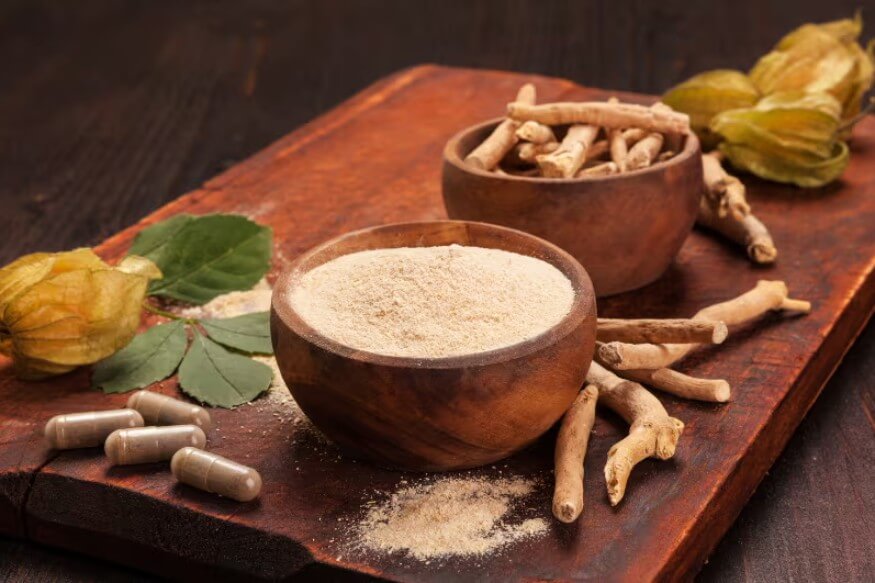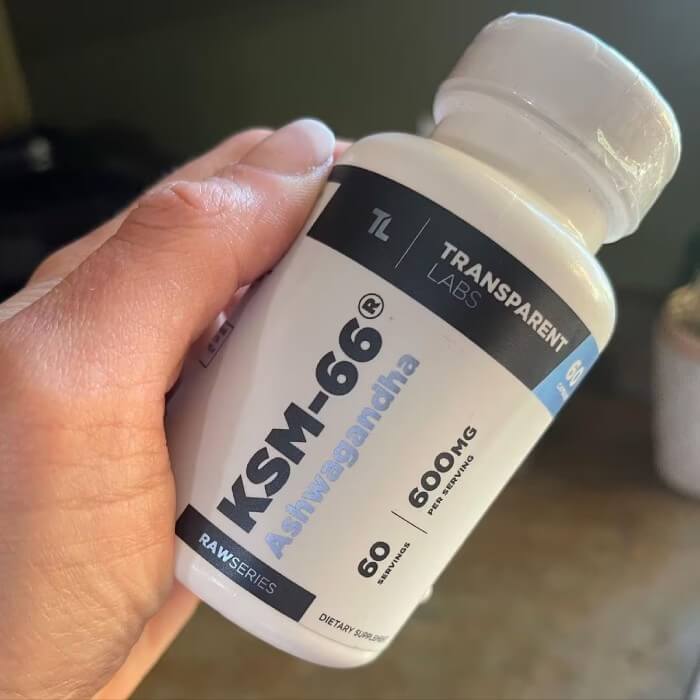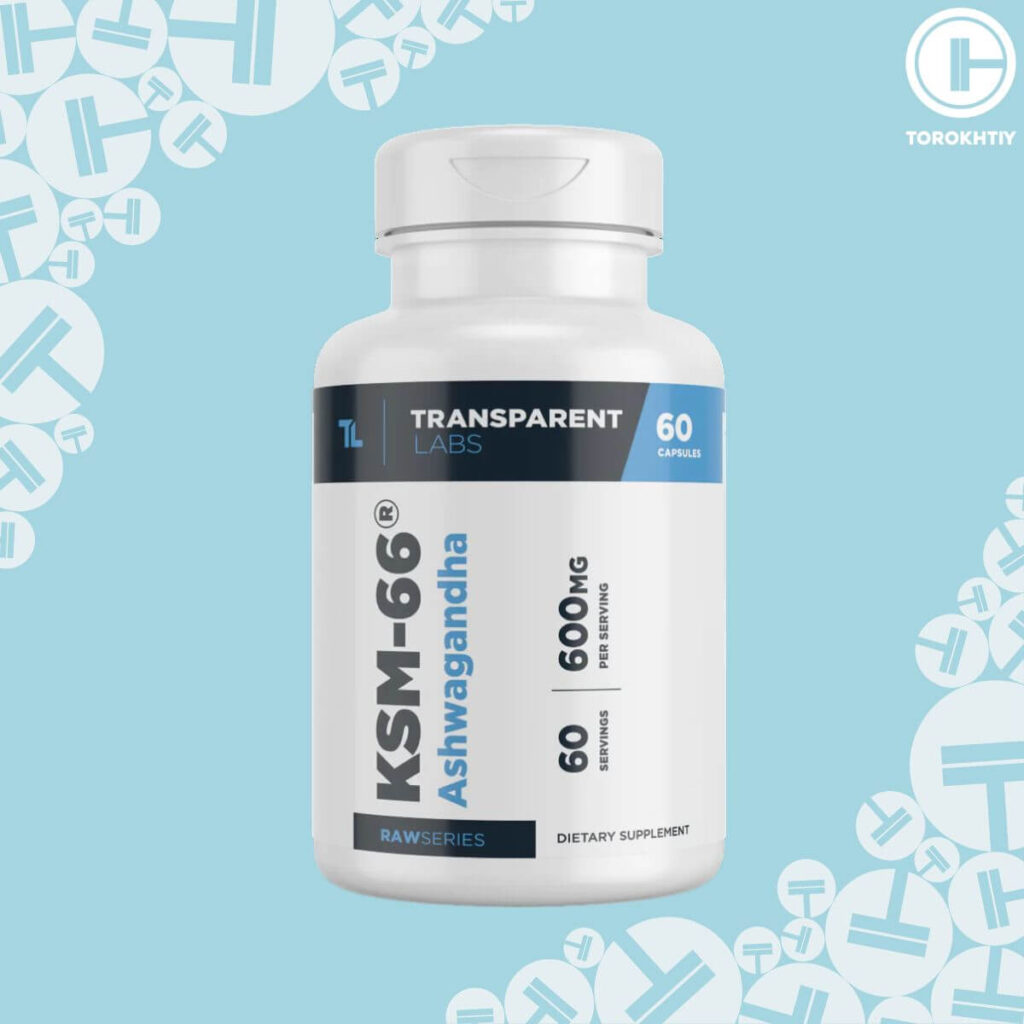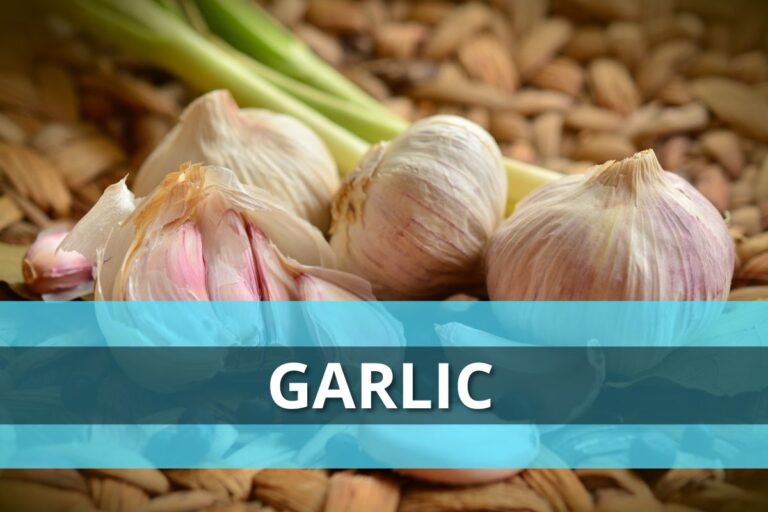How Does Ashwagandha Make You Gain Weight?
Ashwagandha also known as Withania somnifera is a native indian plant, which is commonly used as a “health” supplement.
It is promoted as an adaptogen to help cope with stress and anxiety. The question that brought you here is “does ashwagandha make you gain weight?”
Well… possibly, but the weight gain would likely be through muscle mass, while reducing weight from fat mass.
This occurs through many positive benefits of ashwagandha that have been discussed within this article.
Furthemore, we have included other smart strategies that you could opt to combine with your ashwagandha supplementation to help manage your body composition and weight.
Last but not least, we have highlighted an ashwagandha supplement that we see great value in and highly recommend.
Does ashwagandha make you gain weight? Ashwanganda may help to relieve symptoms of stress and anxiety, followed by unlocking other benefits that may influence healthy weight gain and muscle mass, while reducing weight from fat mass.

Does Ashwagandha Make You Gain Weight?
Can ashwagandha increase weight? Well, Ashwanganda interacts with various pathways of the body to directly and indirectly help lose fat and increase muscle mass.
You could expect a positive impact on body composition and weight through reducing stress and anxiety, improving sleep and muscle growth/recovery.
If you ask me “does ashwagandha increase appetite?” I would say it may do, for those who have lost their appetite as a result of stress and anxiety. Once stress and anxiety have subsided, eating habits may normalize and bring weight back to a healthy level.
How Can Ashwagandha Help With Fat Loss And Muscle Gain?
We should not forget to highlight the most impactful benefits of ashwagandha, that may contribute towards fat loss and muscle gain.
1. Stress And Anxiety
Among its many benefits, ashwagandha has always been touted to reduce symptoms of stress and anxiety. And for good reasons, because it contains bioactive compounds that have been shown to increase brain-derived neurotrophic factor.
With an increase in this “brain protein” our bodies become better adapted to fight off stress and anxiety via a drop in the stress hormone cortisol.Typically, the research suggests ingesting ~600mg of ashwagandha per day would have its full effect on stress and anxiety after 8 weeks of continuous use.
What may come as a surprise or disappointment, stress and anxiety have not shown to have that much direct impact when it comes to body composition.However, with reduced levels of stress and anxiety, one can place their focus on “healthy eating” and engage in a proper exercise routine that can help lose fat and increase muscle mass in the longer term.
2. Better Sleep Quality & Recovery
Many of you are aware that sleep is crucial to how we function and feel on a daily basis. Not only does it help normalize hormone balance and muscle recovery, it dictates how active we are throughout the day which influences daily energy expenditure.
Overall this can help increase muscle mass and lose fat in the longer term.

How To Lose Or Gain Weight In A Smart Way (With Or Without Ashwagandha)?
There are many smart strategies that you could use with or without your ashwagandha supplementation to maximize weight loss or weight gain.
1. Create A Calorie Surplus Or Deficit (Depending On Your Goal)
First of all, you need to figure out your total energy expenditure, which can be done with a simple equation based on various body measurements. These measurements would include: height, age, weight, activity levels and body fat percentage, so ensure that you have these at the ready.
Once these body measurements have been dialed in, you should get an estimate of the amount of calories that you require to maintain your current body weight.
For example, your estimated calories may come up to 2000 calories. In order to gain weight, you would need to be in a caloric surplus. Essentially, this means in simple terms taking in more calories than you need.
For a controlled weight increase with the potential to add a higher ratio of lean mass, we would suggest a 10-15% surplus. Based on our example, this could put you in the bracket of 2200-2300 calories (+200-300).
On the opposite side of the spectrum, those who are flirting with the idea of weight loss, we would need to drive a caloric deficit. As you may have guessed, one would need to take in less calories by reducing food intake (or stay with calories but increasing activity levels – energy expenditure). Generally, we would suggest a controlled caloric deficit up to 25%. So based on our example this would be ~1500-1750 calories depending how aggressively you want to lose weight. Keep in mind that higher the deficit – harder it would be to stay on track.
From what we know, there are ~4100 calories in 1lb of pure fat, which can take around 1,5 week to lose. This is not including the other mass like water, glycogen, and muscle.
2. Eat Enough Protein (Regardless Of Your Goal)
Dietary protein provides your body with the essential amino acids which act as building blocks for the maintenance and growth of muscle mass, along with many other bodily functions. Maintaining a healthy amount of muscle mass is important for mobility and to prevent falls/blunt force injuries. This is especially crucial for the aging population.
Regardless of your goals you should be eating enough protein based on your age and activity levels. The recommended daily intake of protein for healthy adults is at least ~0.8g/kg. As an individual crosses the line of 40 years, a protein intake of 1.2-2g/kg is recommended due to a natural loss of muscle mass known as sarcopenia.
Those who engage in regular physical activity like resistance training, may opt for a protein intake of up to 2.2g/kg to potentially maximize muscle protein synthesis, regardless of losing or gaining weight.

3. Have A Flexible Meal That Consists Of ~85% Healthy Food
We cannot stress the importance of having meals that consist of mostly “healthy” foods like grilled chicken breast, vegetables, and rice.
However, for eating like this to be sustainable over the long term, we highly recommend taking a flexible approach by including things that may otherwise be considered unhealthy like cheese, sauces, or even a small dessert.
Just make sure that you do not go overboard with the amount of calories in the meal. Generally, we tend to divide the total daily calories by the number of meals and snacks that you are planning to have.
For example if you are limited to 2000 calories, you could have three square meals consisting of 600 calories each and a snack of 200 calories.
4. Be Consistent And Patient
Whatever your goal, consistency and patience is key! You must try to hit your calorie target and take your supplements on a regular basis.
Weight changes take weeks and studies have found Ashwagandha to be effective after 8 weeks.
5. Lift Weights
There are a few benefits of lifting weights, both in the short and long term when it comes to body composition.
Lifting weights in the short term burns calories, which depends on the intensity and duration of the training session.
In the longer term lifting weights can increase lean muscle mass, which is the most thermogenic bodily tissue.
This basically means, the more muscle mass you hold the more calories you burn. For each pound of muscle you have you can burn at rest ~6 additional calories per day.
You will find that lifting weights overtime would have a positive impact where you are likely to have more lean mass and less fat mass.
KSM-66 Ashwagandha
- Item form: Capsules
- Best for: Muscle gain, fat loss, stress and anxiety, sleep quality, balance hormones,
- Type: Adaptogen
- Servings per container: 60
- Suitable for vegans: Yes
- Other ingredients: Rice flour, Hypromellose, Vegetable magnesium stearate
- Price per serving (1 capsule): ~$0.33
- Company founded: 2015
- Recommended by athletes: Hafthor Jullius Bjornss, Kelsey Henson, Paul Sclar
The KSM-66 Ashwagandha by “transparent labs” is a reasonably priced yet effectively dosed supplement.

Each capsule contains 600 mg of ashwagandha which has “proven” to be effective in stress management and possibly weight management.
FAQ
Does Ashwagandha Cause Weight Gain Or Weight Loss?
Ashwagandha helps reduce the effects of stress, improves sleep quality, and has other positive effects that can influence eating behavior and lead to weight changes. It can cause some weight gain through muscle, while weight loss through fat.
Is Ashwagandha Good For Weight Gain?
When we are talking about ashwagandha and weight gain, it may help normalize mood and eating behavior, therefore it is good for weight gain, other than that it can help put muscle on.
Can I Take Ashwagandha During Fat Loss?
Certainly! Ashwanganda has many benefits that may contribute towards fat loss, but remember to reduce calories and exercise too.
How To Use Ashwagandha For Weight Gain?
If you’re using ashwagandha for weight gain, simply take 600 mg of ashwagandha consistently every day and you may start noticing a difference within 4-12 weeks, but ensure you focus on other strategies too, like increasing food intake, protein and lifting weights.
Conclusion
All in all, ashwagandha has many benefits to reduce stress/anxiety, and improve sleep/recovery. These benefits may help gain healthy weight through muscle mass and lose excess fat mass.
Take into account that using smart strategies to manipulate calories, protein intake, food choices, exercise and patients would have the biggest impact on weight management, especially when combined with your ashwagandha supplementation.
If we have spiked an interest in ashwagandha supplementation, consider taking the KSM-66 Ashwagandha by “transparent labs”.
We hope that you enjoyed the article, please do not hesitate to leave us a comment, question or query.
Also read:
- Does Ashwagandha Increase Testosterone
- Tongkat Ali vs Ashwagandha
- Rhodiola vs Ashwagandha
- How Long Does Ashwagandha Take To Work
- Nutrition Ashwagandha
- Ashwagandha Benefits for Weight Loss
- Best Electrolyte Powder
References:
- Bashir, A., Nabi, M., Tabassum, N., et al. An updated review on phytochemistry and molecular targets of Withania somnifera (L.) Dunal (Ashwagandha) Frontiers Of Pharmacology, 14(1): 1-15, 2023
- Rob, tdeecalculator (2023) Learn How Many Calories You Burn Every Day (accessed: 6/09/2023) Available at: https://tdeecalculator.net/
- Verma, P. Protein Deficiency and Poisoning Research & Reviews: A Journal Of Medicine, 13 (1): 9-16, 2023
- Baum, J.I., Kim, Y., Wolde, R.R. Protein Consumption and the Elderly: What Is the Optimal Level of Intake? Nutrients, 8(6): 359, 2016
- Evans, C., Rojas, J., Curtis, J., et al. Recent Perspectives on the Role of Dietary Protein in Physically Active Individuals Research Direct In Healthcare, 3(1), 2023
- Wang, Z., Ying, Z., Bosey, W., et al. Specific metabolic rates of major organs and tissues across adulthood: evaluation by mechanistic model of resting energy expenditure The American Journal Of Clinical Nutrition, 92(6):1369-1377, 2010
Why Trust Us?
With over 20 years in Olympic Weightlifting, our team does its best to provide the audience with ultimate support and meet the needs and requirements of advanced athletes and professional lifters, as well as people who strive to open new opportunities and develop their physical capabilities with us.
By trusting the recommendations of our certified experts in coaching, nutrition, dietology, and sports training programming, as well as scientific consultants, and physiotherapists, we provide you with thorough, well-considered, and scientifically proven content. All the information given in the articles concerning workout programming, separate exercises, and athletic performance, in general, is based on verified data. We ensure that you can rely on our professionals’ pieces of advice and recommendations that can be treated as personalized ones which will benefit you and fully meet your needs.
The product testing process is described in more detail here
Author: Jacek Szymanowski
Certified Nutritionist,
M.Sc.Eng. Biotechnology
Performance Architect,
Strength and Conditioning Specialist
With over 30 years of fighting experience, specialization in nutrition coaching for athletes, and expertise in metabolic health and dietary strategies, Jacek offers a comprehensive approach to optimizing your performance and well-being. Backed by a Master of Science degree in Biotechnology, Jacek remains at the forefront of scientific advancements, ensuring that his coaching is always evidence-based and up-to-date.








